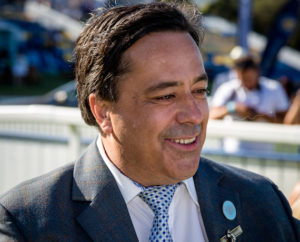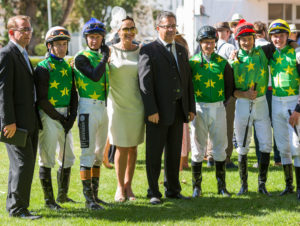
LONDON — South Africa’s horse racing industry is about to be jolted out of its astonishing complacency after the exposure of its largest patron as an industrial scale fraudster. As the Sporting Post’s Robyn Louw discloses this morning in the piece republished below, South Africa’s Public Protector is launching an investigation into the industry which disgraced Steinhoff CEO Markus Jooste has dominated for years. This is the result of the tireless efforts of Jooste’s racing nemesis, Ms Phindi Kema. By channelling hundreds of millions of his ill-gotten gains into the industry, Jooste and his cronies secured an increasingly powerful position since becoming involved two decades ago. Despite his well documented disgrace and subsequent exposure as an industrial scale fraudster, Jooste’s silks continue to grace South African racecourses, apparently because the banks to whom his Mayfair Speculators is indebted want an “orderly” disposal of his racing stock. That SA’s highest profile crook remains an ever present feature in SA racing supports the view of many that those holding senior positions in its administration remain Jooste loyalists. The Public Protector is about to shake them out of their blinkered stupor. – Alec Hogg
By Robyn Louw*
The Public Protector, Busisiwe Mkhwebane, has initiated a public hearing into the maladministration of horse racing in Gauteng and the role played by the industry’s biggest player, Markus Jooste, a key shareholder in the Province’s betting operator, the public company Phumelela Gaming and Leisure Limited.
The matter arises out of a complaint initiated by Ms Phindi Kema against the Gauteng Provincial Government, which set up Phumelela in 1998 in a reorganisation of racing’s traditional structures, but exceeded its authority by transferring 5 racetracks located in other Provinces into the ownership of the public company without adhering to appropriate procedures.

Ms Kema argued that the process that formed Phumelela was “questionable and unlawful” and as a consequence, Phumelela had unfairly enriched a handful of its shareholders at the expense of other participants in the industry.
As the Gauteng Provincial Government has agreed that this transaction has failed to benefit the horse racing sector and South Africa, the Public Protector had written to Phumelela to advise them that they would be negatively affected by the outcome and the call for remedial action.
Key Player
He served on the board of Phumelela with the voting right of the Trust as well as being a substantial shareholder in his own name and in another company called Kalamojo Pty Ltd, which he owned with Bernard Kantor, a director of Phumelela since inception and now Chairman of the Phumelela Board. Markus Jooste joined the board of the Racing Association within months of the listing of Phumelela in 2002 and was subsequently appointed by them to serve as a Trustee of the Horseracing Trust Pty Ltd, a non profit body, which assigned all the assets of horse racing into Phumelela in exchange for a 35% shareholding, and which was charged with protecting the ethos of the sport as well as being responsible for transformation.

A pivotal role was played by Markus Jooste and his closest allies in the racing industry, not only in the betting company and racing organiser Phumelela, but also on the Trust responsible for the protection of the Sport, and its counterpart, the Racing Association. In addition, his array of companies also included being the biggest owner of racehorses, the biggest breeder of racehorses, the biggest buyer of thoroughbreds, the biggest employer in racing and also the ownership of the auction sales company CTS Pty Ltd, the biggest seller of horses in South Africa. In addition, Phumelela executives served on the board of the regulator, the National Horseracing Authority.
Criticism of such an alignment of interests raised speculation of ‘racings capture’ and has focused attention on the Gauteng Provincial Government, which created both the vehicle as well as the opportunity.
Captured?
 Since listing in 2002, Phumelela has controlled the sport and has sold off a number of racetracks, causing a shrinkage within the industry – and according to an Economic Impact Study, the consequence has been the loss of 85,000 jobs and a failure to provide transformation, whilst the public company share price has risen from 50 cents at listing to a peak of R26 in 2016, currently trading at R17,00 giving it a market capitalisation of R1,6 billion.
Since listing in 2002, Phumelela has controlled the sport and has sold off a number of racetracks, causing a shrinkage within the industry – and according to an Economic Impact Study, the consequence has been the loss of 85,000 jobs and a failure to provide transformation, whilst the public company share price has risen from 50 cents at listing to a peak of R26 in 2016, currently trading at R17,00 giving it a market capitalisation of R1,6 billion.
A number of prominent people within the horse racing industry, including six current or former directors, have been asked to testify in the public hearings as well as representatives of many branches of the sport and industry in order to outline the impact.
- Robyn Louw describes herself as a part time writer, full-time horse addict. Since 2010 she has been a columnist for the Sporting Post, South Africa’s only independent horse racing newspaper.
Phumelela Gaming media release: Response to Kema complaint
Phumelela Gaming has responded to the Phindi Kema complaint with the Public Protector against the Gauteng Provincial Government for allegedly exceeding its authority by transferring five racetracks located in other provinces to Phumelela.
Phumelela’s response states: “Ms Kema has a history of instituting meritless complaints and litigation against Phumelela. This includes a matter in which Ms Kema appealed against a finding of the Competition Tribunal, without success, to the Competition Appeal Court and the Constitutional Court. Both of these courts granted cost orders against Ms Kema. These taxed costs are in excess of R250 000 (excluding interest thereon) and Ms Kema has, despite demand, failed to settle the cost orders.
Ms Kema’s original complaint, which was made in 2013, was that in 1997 the MEC in Gauteng transferred the Arlington Racecourse in Port Elizabeth to Phumelela without following due process. The obvious and immediate question must certainly be how likely is it that the Gauteng government owned a racecourse in Port Elizabeth? The allegation is hilarious, to put it mildly.
Phumelela has substantiated to the Public Protector that Arlington has not been owned by the South African Government or by any public authority since at least 1815. Phumelela has acquired its racecourses from racing clubs, which belonged to their members. It did not buy any racecourse from government.
Phumelela has co-operated and will continue to co-operate with the investigation of the Public Protector insofar as it pertains to state affairs or in the public administration. Phumelela has reserved its rights to request compensation for the expenses it has incurred in connection with the investigation, in accordance with section 10 of the Act.”

